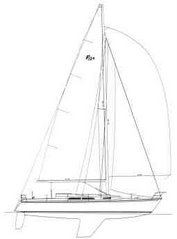forward to getting out of here. Our friends Colin Sutton and Mary
Joyner (MJ), both NOLS Instructors, flew in last night, armed with
bags of dive gear, fishing gear and spear guns. I think we will be
eating a lot of fish in the next month.
We will take off early Wednesday morning if we can get our projects
done. Once again our Spectra watermaker is acting up, but we are
hopeful of getting it going. The constant aggravation of working on it
is still not as bad as jerry-jugging questionable water in the dinghy.
Our Raymarine autopilot and instruments (GPS, wind, depth, etc.) have
slowly been failing, one by one, so tomorrow we'll replace the GPS
unit with the new one that Colin brought. We've been navigating with a
Gecko handheld since Niue, which works but is slightly annoying. A few
other projects, provisions, fuel, propane (butane around here), and
then we should be good to go.
We won't miss the tuna factories and their stinky exhaust. Supposedly
they produce 50-percent of American tuna can supplies, churning out
over a million cans of packed tuna a DAY. The factories employ over
5,000 people, many of whom are from China and Korea. Some of the
locals we've talked to have expressed resentment at the foreign
workers who come for the $3.25 minimum wage here, as opposed to
60-cents in the non-American islands.
Right now the water around our boat in the bay is bright red, which we
thought at first was tuna blood (!). But it turns out that it's an
algae bloom caused by illegal Chinese laundry detergent. Combined with
the thousands of floating plastic bags, bottles and garbage, it's a
grim sight.
We are heading back to Tisa's Barefoot Bar for dinner tonight, where
Colin and MJ will also enjoy their last night on terra firma. Tisa
grew up here, in the village where her place is. She went to school in
the U.S., and when she came back to Samoa she decided something had to
be done about the garbage everywhere, and the struggling fish
populations. So she has created a de facto marine park on the beach in
front of her village; she doesn't allow fishing, dumping or hunting of
birds or fish. Apparently the locals respect her "park," and the
wildlife is flourishing and there is less trash washing ashore.


1 comment:
very interesting..... the chinese just keep getting in trouble...
Post a Comment